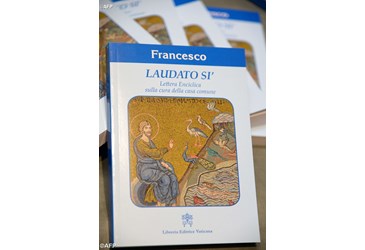Now, also the Catholic Church calls upon taking more care of Nature !
Discussion details

It is probably the first time in history that an Encyclical from the Head of the Catholic Roman Church is entirely devoted to ecology ! Rome turns green and we are very deligthed with this !
Pope Francis' first encyclical - Laudato si: on the Care of our Common Home - is focused on the idea of 'integral ecology', connecting care of the natural world with justice for the poorest and most vulnerable people.
At the heart of the Pope’s reflections is the question: “What kind of world do we want to leave to those who come after us, to children who are now growing up?”. The answers he suggests call for profound changes to political, economic, cultural and social systems, as well as to our individual lifestyles.
Chapter 1 sets out six of the most serious challenges facing “our common home”:
- pollution, waste and throwaway mentality
- climate change
- water
- biodiversity
- breakdown of society
- global inequality
What does it say on biodiversity? “Each year sees the disappearance of thousands of plant and animal species” and the consequences cannot be predicted as “all of us, as living creatures, are dependent on one another”. Often transnational economic interests obstruct this protection.
Chapter 3 explores some of the deep root causes of these growing crises:
- technology and in particular biological technologies
- technocratic an profit-oriented mentality
- anthropocentrism
- practical relativism
- lack of employment
Then, the Encyclical explores solutions. Besides those ones typically related to Christian faith, such as spirituality, relationship with God and lessons from the Old and the New Testaments, Pope Francis also elaborates on proposals which are, at the end of the day, very much in line with what has been said and claimed and repeated and pleaded for years and years, from Rio1992 to Rio+20 and beyond.
Some chosen bits:
- Integral ecology: the analysis of environmental problems cannot be separated from the analysis of human, family, work-related and urban contexts.
- Dialogue: need for honest and open debate, so that particular interests or ideologies don't prejudice the common good.
- Education: help reshape habits and behavior, overcoming individualism, changing our livestyles and consumer choices.
On the other hand, we have been much less used to hearing or reading a statement like this one, in our endless international negotiation sessions and meetings and conferences: Ecological conversion: taking Saint Francis of Assisi as a model of a more passionated concern for the protection of our world, characterised by gratitude and generosity, creativity and enthousiasm.
Without preempting of everybody's religious faith or spiritual preferences, let us acknowledge that this is a very good step achieved by the Vatican.
Well done, Pope Francis, you deserve to be a true B4Life guy !
The full text of the 'Laudato Si' Encyclica can be found here.
(1)
Log in with your EU Login account to post or comment on the platform.
Et voilà ! notre ami Braulio Diaz, patron de la Convention sur la Diversité Biologique, a lui aussi réagi !
Voyez sa déclaration ici (en anglais):